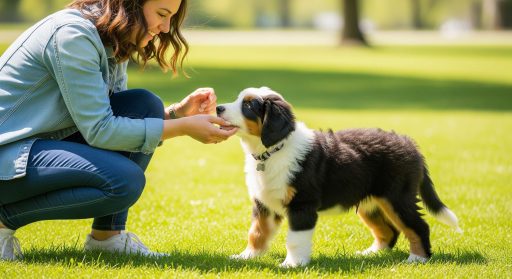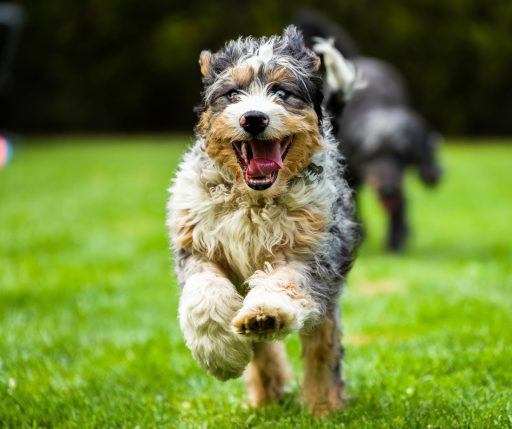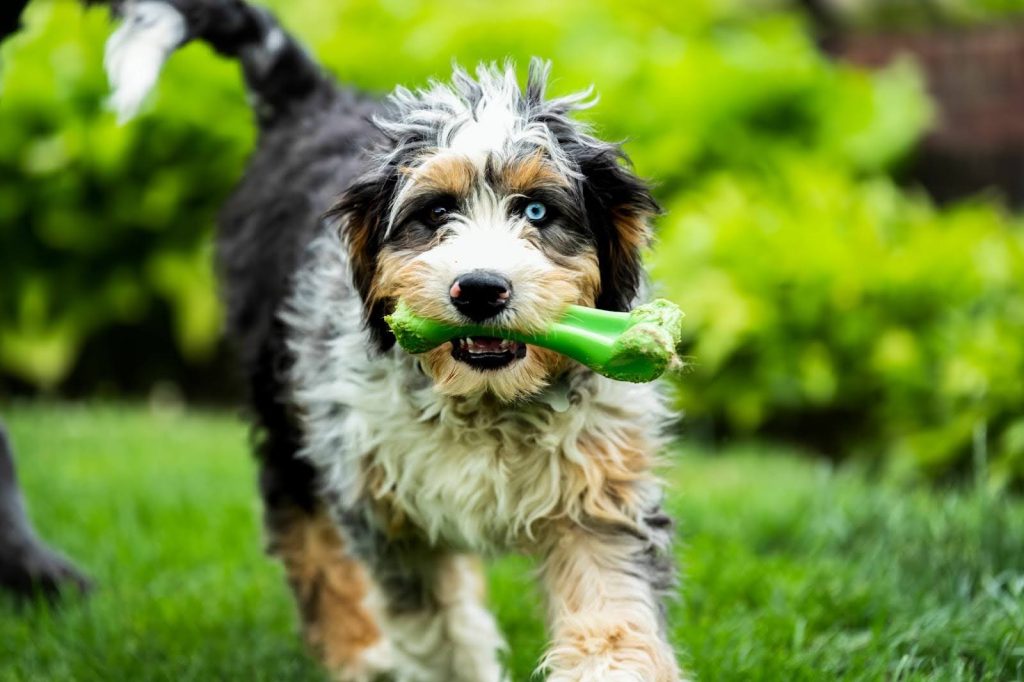Bringing home a Bernedoodle puppy is exciting; they’re playful, affectionate, and incredibly smart. But to raise a confident and well-mannered dog, you’ll need more than snuggles and basic training. Early socialization shapes how your Bernedoodle responds to people, places, and other animals for the rest of their life.
So, what is puppy socialization? For a Bernedoodle, it means introducing them to everyday experiences in a positive, low-pressure way. These dogs tend to be gentle and people-focused, but without the right exposure, they can develop anxiety or timid behavior. Socialization helps your puppy grow into a calm, friendly companion who feels at ease in different environments.
In this guide, you’ll learn how to socialize a Bernedoodle puppy step by step—when to start, what to include, and how to make every new experience a positive one.
🐶 Key Takeaways
- The best time to socialize your Bernedoodle is between 3 and 16 weeks of age
- Early exposure builds confidence, reduces fear, and improves behavior long-term
- Use calm environments, treats, and positive reinforcement to shape good reactions
- Puppy classes, short outings, and playdates all support healthy social development
- You can still socialize older dogs, just make sure to go slower and focus on safe, positive experiences
Why Is Socializing Your Bernedoodle So Important?

Bernedoodles are known for their loving nature and eagerness to please, but they can also be cautious around unfamiliar people or settings if they weren’t socialized early on. Early exposure helps them learn how to handle new situations without fear or overreaction.
Here’s what socialization does for your puppy:
- Reduces fear and anxiety – A dog that hasn’t been exposed to new sights, sounds, or people may become jumpy, overly shy, or reactive as they grow.
- Builds confidence – These pups thrive on positive experiences. Exposure builds a more self-assured and relaxed adult dog.
- Improves social manners – They’re naturally social, but still need guidance to interact calmly with kids, guests, and other pets.
- Boosts training success – A calm, confident pup is easier to train and less likely to shut down when learning new commands.
- Prevents behavior problems – Issues like barking at strangers, leash pulling, or separation anxiety often start with a lack of safe exposure to the outside world.
- Makes public outings easier – If you plan to take your dog to pet-friendly stores, parks, or on trips, socialization helps them stay calm and well-behaved in busy environments.
The more positive experiences your puppy has in those early months, the easier it’ll be for them to adjust to your lifestyle.
When to Socialize a Bernedoodle Puppy

The most important time to start socializing your puppy is between 3 and 16 weeks old. This is when they’re most open to new experiences and least likely to develop fear-based reactions.
👉 Early Socialization (3–12 weeks):
This is the sweet spot. Your puppy’s brain is soaking up everything, so use this time to introduce them to a variety of safe sights, sounds, people, and other animals. Keep each experience positive and controlled.
👉 Continued Socialization (12–16 weeks):
The sensitive window starts to close, but it’s still a key time to keep going. Reinforce what they’ve already learned and add in new environments like car rides, sidewalks, and vet visits.
👉 After 16 Weeks:
Just because the window closes doesn’t mean you stop. Keep introducing new things as your Bernedoodle grows. Regular walks, playdates, and visits to new places will help them stay calm and confident throughout their life.
How to Socialize a Bernedoodle Puppy

Now let’s get into the how. Socializing your Bernedoodle doesn’t mean throwing them into noisy crowds or chaotic dog parks. It means guiding them through new experiences at a comfortable pace and making each one feel safe and fun.
Here are simple ways to get it right:
- Start slow with new experiences: Let them explore new sounds, smells, and places one at a time. For example, play quiet traffic sounds before your first walk along a busy street. Keep outings short and easy at first.
- Use treats and praise: Every time your puppy meets someone or hears a new sound, reward them. A small treat and a happy tone go a long way in helping them link new experiences with good feelings.
- Join a puppy class: Look for classes where puppies can learn manners and play in a supervised setting. It’s a safe way to teach them how to interact with other dogs while working on obedience basics.
- Set up safe doggy playdates: Let your pup play with calm, vaccinated dogs close to their size and energy level. Always supervise to make sure the play stays friendly and not too rough.
- Get them used to handling: Touch their paws, ears, and mouth regularly. Let them sniff grooming tools. Offer a treat afterward. This makes vet visits and grooming way less stressful down the line.
- Help them adjust to noise: If they startle at loud sounds, play them softly in the background and slowly increase the volume. Think thunder, doorbells, or vacuum cleaners, gradual exposure helps desensitize them.
- Keep it short and sweet: Puppies have short attention spans. A few minutes of focused socialization is better than an hour that ends in overwhelm. Always end on a positive note.
- Watch their body language: If your pup looks unsure, yawning, turning away, lip-licking, or freezing, it’s time to pause. Let them take breaks and come back to it when they’re ready.
Can You Socialize an Older Bernedoodle?

Yes, it’s absolutely possible. If you’ve adopted an older Bernedoodle or missed the early socialization window, don’t worry. It just takes more patience and a gentle approach.
Start slow. Introduce new people, places, and other dogs one at a time. Use high-value treats and calm praise to build trust and help them feel safe. If they seem unsure or hesitant, give them space; don’t force anything.
Older dogs often carry past experiences, so if yours seems fearful or withdrawn, it might help to work with a trainer who understands gentle desensitization. Keep outings short and positive, and celebrate small wins along the way.
No matter their age, a Bernedoodle can still grow into a calm, social companion with consistent support and encouragement.
Find Your Well-Socialized Bernedoodle at Central Illinois Doodles
Raising a calm, confident dog starts with the right foundation. At Central Illinois Doodles, we understand how important early socialization is, so we start that work from day one. Our Bernedoodle puppies grow up in a hands-on environment where they’re gently introduced to people, sounds, textures, and safe play.
By the time they join your home, they’ve already been exposed to the basics, giving you a head start on training, bonding, and building trust. These early experiences help your puppy adjust smoothly to your family and routine.
If you’re ready to welcome a well-socialized Bernedoodle into your life, take a look at our available puppies today. You’ll appreciate how early care and proper handling shape a confident, happy companion.
Frequently Asked Questions
What is the most important time to socialize my Bernedoodle puppy?
The best time is between 3 and 16 weeks of age. During this period, your puppy is most open to new experiences and least likely to react with fear. Positive exposure during this window sets the tone for how they respond to the world as they grow.
How do I socialize a Bernedoodle with other dogs?
Start with calm, well-mannered dogs that are fully vaccinated. Keep introductions short and positive. Use treats and praise to reward good behavior. Always supervise and look for signs that your pup feels safe and comfortable.
What are the signs of a poorly socialized Bernedoodle?
You might notice shyness, fear around strangers or other dogs, excessive barking, or trouble adjusting to new places. These behaviors often come from a lack of early exposure. With patience, many of them can be improved over time.
Can I socialize my Bernedoodle at home?
Yes. You don’t need busy parks to get started. Invite friends over, introduce different surfaces like tile or grass, let them hear household sounds like the vacuum or blender, every small experience counts when it’s handled gently.
What if my Bernedoodle seems scared during socialization?
That’s totally normal. If they pull away, freeze, or look unsure, slow things down. Give them space, let them observe, and reward calm behavior. Forcing it never helps; confidence builds over time through positive repetition.
